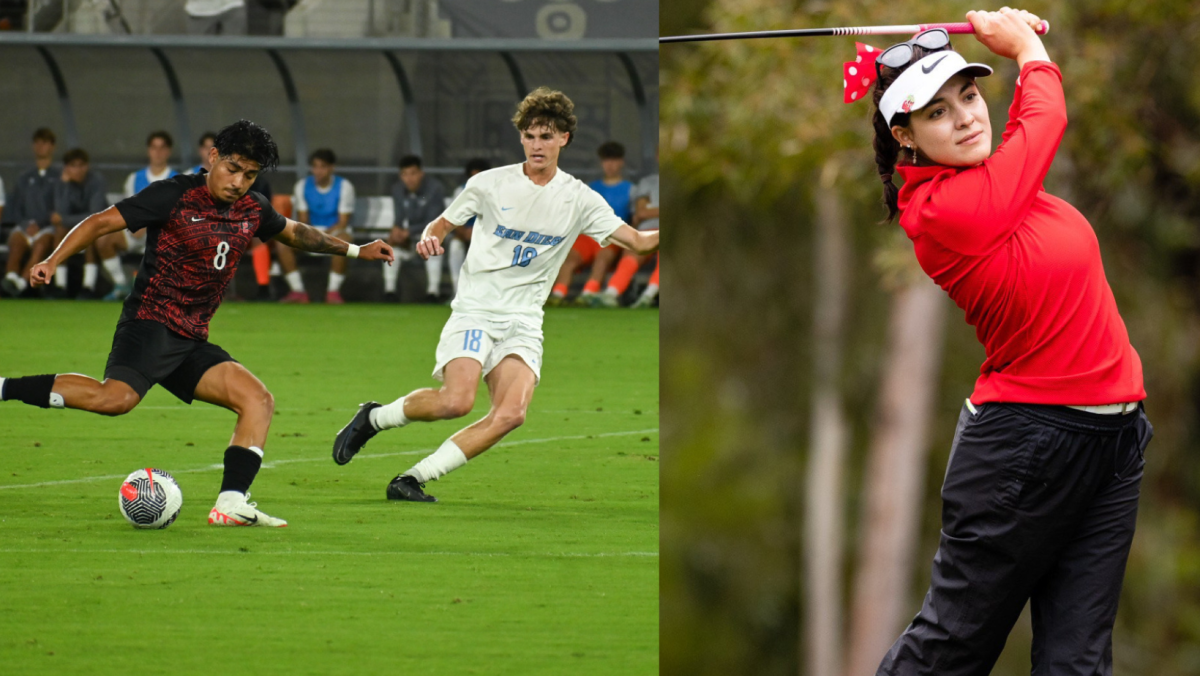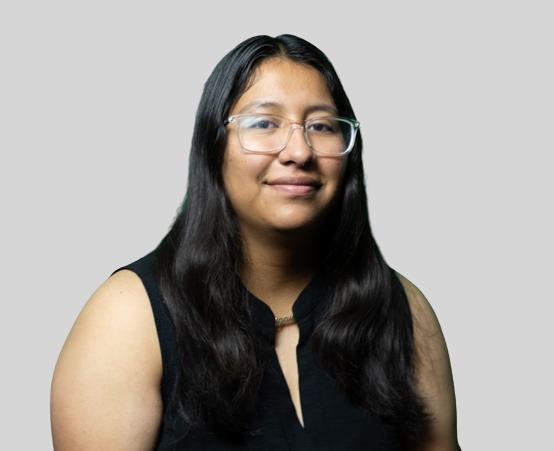San Diego State Athletics has a number of athletes who come from different backgrounds. Of these backgrounds are Hispanic athletes who participate in multiple sports.
SDSU is a Hispanic-serving institution, and according to Data USA, students who are either Hispanic or Latino make up 33.2% of the university’s population as of 2021.
Student-athletes like Andrea Gómez Ortizibarra and Beto Apolinar, who are Mexican descent, have taken pride in their culture.
Gómez Ortizibarra — born and raised in Queretaro, Mexico — plays on SDSU women’s golf team. Gómez Ortizibarra is a senior studying interdisciplinary studies with an emphasis in art history, journalism and communications.
Gómez Ortizibarra felt pride in her Hispanic heritage once she came to the United States when saw more Latinos like herself.
“Now that I’m living here in the U.S., it means that people from all over Latin America, we’re connected by history,” Gómez Ortizibarra said. “It’s just something really special, coming from Mexico. You don’t really feel it’s something you live in every day, but once you’re away from your country, you just feel a sense of pride that there are more people like you in the U.S.”
Apolinar, who plays for SDSU men’s soccer team, is a junior studying psychology. He was a red-shirt during the 2021 season, meaning when he was a freshman, Apolinar had an extra year of eligibility to play. His parents are from Puebla, Mexico, but his hometown is in the San Fernando Valley in Los Angeles County.
For some immigrant families, parents struggle to reach their goals; however, they ensure their children are supported enough to achieve their own dreams. For Apolinar, those sentiments hold true to his family. He credits his father for helping him achieve his goal of becoming a Division I athlete.
“My dad used to play soccer as well, but he never had that support that he gives me,” Apolinar said. “I play every game for my dad, my mom (and) my whole family.”
Gómez Ortizibarra takes pride in playing as a Mexican collegiate athlete, and she expresses the love she has for her country.
“It’s something very special, I had the opportunity to play the Latin America World Amateur in 2021,” Gómez Ortizibarra said. “Being able to represent Mexico on a stage that big just gave me pride having my name said after my country, it was very emotional for me.”
Both Apolinar and Gómez Ortizibarra talked about why it’s important to celebrate their Hispanic Heritage.
“It’s not talked about a lot and for me; I’m a first-generation collegiate athlete, (and) not a lot of people know that,” Apolinar said. “I know that there are a lot of students that come to this school that have a similar background as me, so I just think that it’s important to talk about it.”
Additionally, Gómez Ortizibarra mentioned the battles that Latinos faced throughout history and are still facing now. At the same time, she acknowledges what makes Latinos so distinctive from other cultures.
“It tells you more about the person. It shows what we have gone through and still going through on a daily basis, and celebrating what makes us unique and special,” Gómez Ortizibarra said.
While Apolinar has not faced challenges as a Hispanic athlete, Gómez Ortizibarra has faced discrimination as the sport she plays doesn’t align with societal norms.
“Being looked down on has been a big one that I remember the most,” Gómez Ortizibarra said. “Golf is a big sport in Mexico but people in the U.S. don’t see it as such, so people think, ‘Oh you’re from Mexico you’re not a good golfer.’”
What keeps both of them going is their family. Apolinar has also appreciated the coaching staff here at SDSU.
“My parents have inspired me a lot. They have supported me ever since I was seven with my dream of playing golf, and now I want to play golf professionally once I graduate school,” Gómez Ortizibarra said.
Before Ortizibarra’s grandfather passed away, he gave her a piece of advice: “the most important thing to do is have fun and enjoy the moment I’m out there on the golf course.”
“I talk to my mom every day, she’s the main reason she inspires me,” Apolinar said.
“The coaching staff here pretty much give me great advice and they take care of me.”
Apolinar and Gómez Ortizibarra are great examples for kids who see them, which makes a difference by providing representation. Both athletes gave advice to Latino kids who are trying to pursue sports.
“The pressure your parents put on you doesn’t have to be exactly what they want you to do — it could be anything you want to do and give it your all every day,” Apolinar said.
Gómez Ortizibarra, also holding this message, tasks individuals to put themselves out there to ensure their voices are heard.
Although Apolinar is a full-time student-athlete, for him, it has been difficult not being near his family because they are an important factor in his life.
“(For me and my parents) this situation that we’re in, I don’t really get to see them that often, because they can’t really come up here (SDSU),” Apolinar said. “I guess it just gets hard sometimes. I can always call them, but it’s not the same as in person. Whenever I’m sad, I try to do things that make me happy — which could be anything — like hanging out with friends or going to the beach just to keep me off and not thinking of that.”
The impact that Hispanic athletes have on people — whether it be Hispanics or other people of color — is a great foundation that has been set at SDSU.











